A strong online presence for organizations today is not just an alternative, it has become a real need in our fast-paced advanced world. With over 2.9 billion monthly active users, Facebook is still one of the most popular social media platforms out there. A lot of these are businesses using the platform to engage with customers through Facebook business pages.
But what happens when a company needs to remove itself from Facebook? Whether you are rebranding, closing down or just taking time out, there is a way to manage your Facebook business page effectively. And this can be done by deactivating the account or deleting it permanently.
In this blog post, we will tell you how to delete fb business page and also the steps required to deactivate it. We will also get to know the difference between these two modes with detailed steps to make sure you make the right decision for your business.
Understanding the Difference: Deleting vs. Deactivating a Facebook Business Page
To better explain the steps, first, let me clarify what is deleting and deactivating a Facebook business page. The way to pick between them depends totally on the needs.
Delete a FB Business Page:
This means removing it permanently from the platform. When this page is deleted it can never be retrieved with all content, followers and data lost for eternity. It is destructive, and you should only use it if you are positive that the page won't be used again (ever).”
So, when to choose Deletion?
The deletion choice is the most recommended if you know beyond doubt that you are done with your organization's Facebook page. That might be because your business is shut, or you are shifting onto another platform or merging pages and just want to get rid of the duplicate ones.
Deactivating a Facebook Business Page
This is only temporary. It helps to hide the page from the other users but leaves all its contents/the page itself untouched. You can use once again the page whenever you want in its original state. This is a good option if you want to return to your page in the future or you need some break from managing it.
So, when to choose Deactivation?
This is perfect if you are on the fence about closing your page down indefinitely. It is also suitable if you are re-branding, making some changes, and want time to organize your thing but don't want the public to see your current setup.
How to Deactivate FB Business Page?
If you are planning on trying to take a break or anything instead of deleting your page forever, you should use deactivating. So below is the step by step to deactivate the Facebook business page in a few minutes.
Step 1: Open The Page Settings
- Login to Facebook > Click on the page of your business.
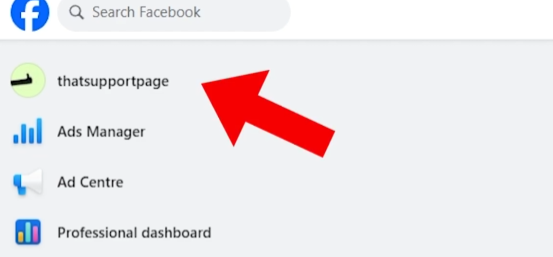
- Now click on the setting option.
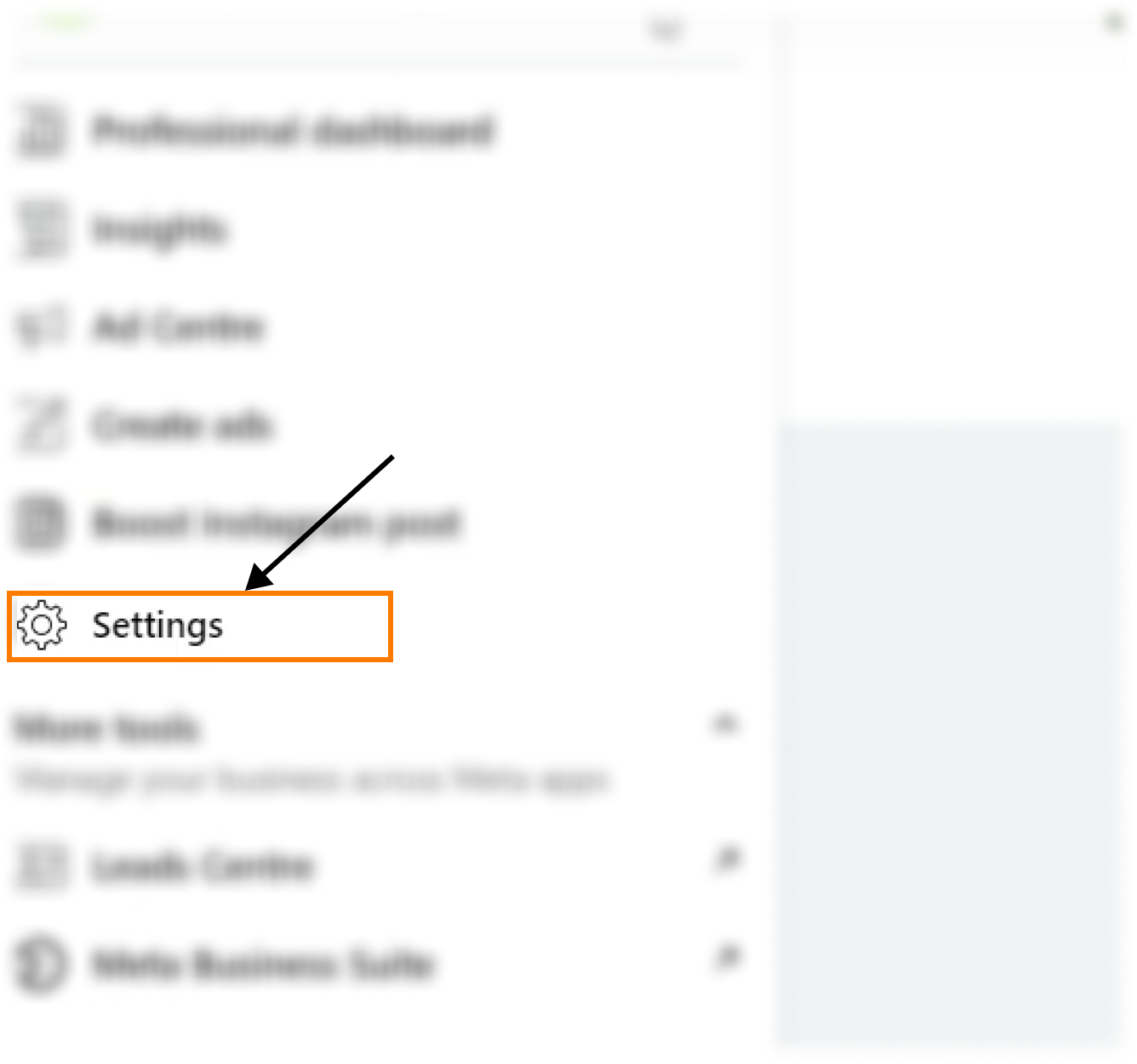
Step 2: Choosing the Deactivation Option
- Look for the access and control option in settings.
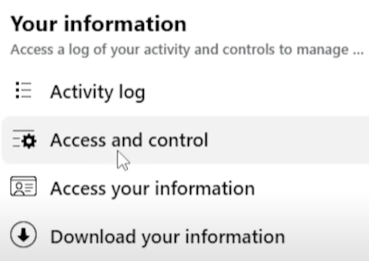
- From here, you will see an option to "Deactivate Page." Click on it.
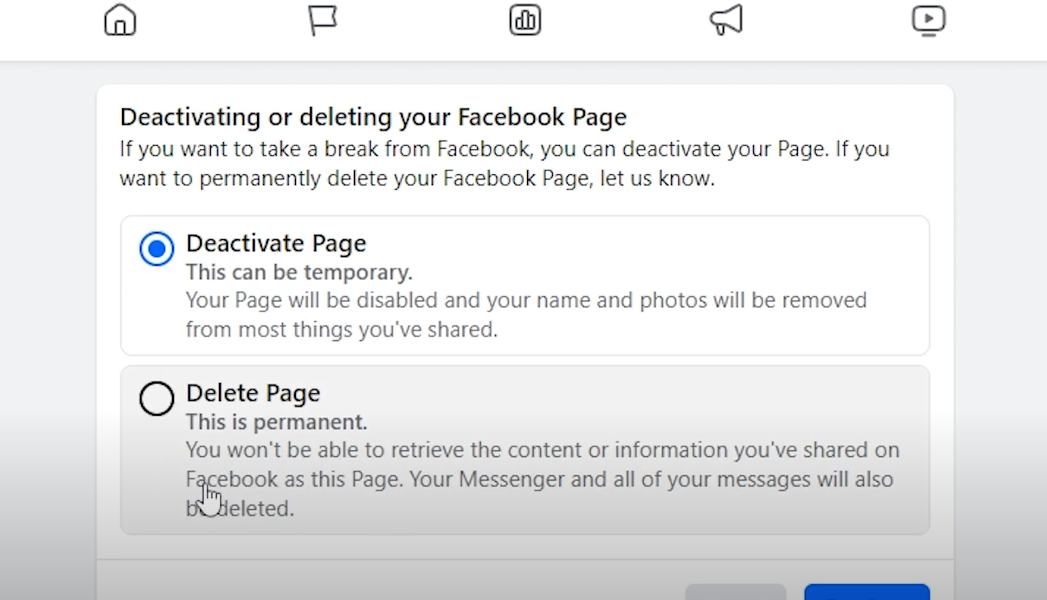
Step 3: Confirm Deactivation
- On the following page, Facebook will ask you to confirm whether or not you want to deactivate your page. Go through any warnings or prompts.
- Click on “Continue” to confirm your choice.
Step 4: Reactivating the Page
Again login and visit your page. Thus you can enable it again at any point in time and everything will be exactly intact as before!
How to Delete FB Business Page?
If you think that deleting your page is the right action to take, here are five steps on how it can be achieved:
Step 1: Open The Page Settings
- Login to Facebook > Click on the page of your business.

- Now click on the setting option.

Step 2: Choosing the Deactivation Option
- Look for the access and control option in settings.

- From here, you will see an option to "Delete Page." Click on it.
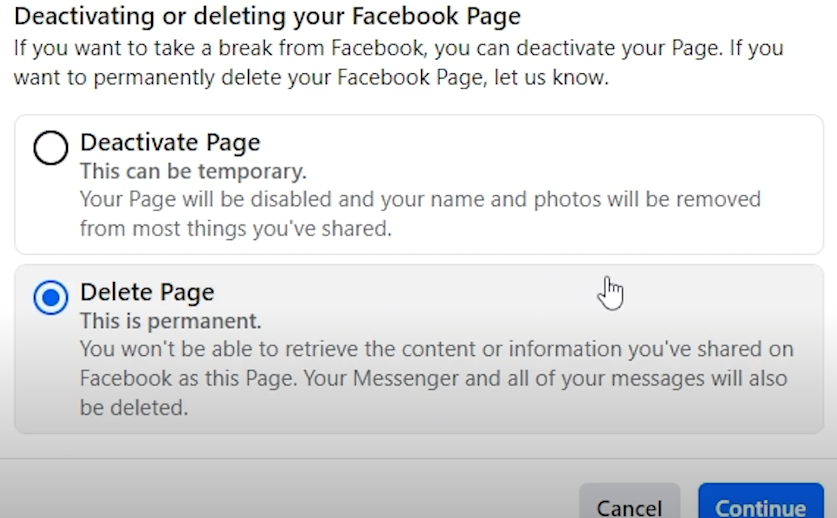
Step 3: Confirm Deletion
- On the following page, Facebook will ask you to confirm whether or not you want to delete your page. Go through any warnings or prompts.
Note: There is an option to download the page info or you can also transfer a copy of your information to some other service.
- Click on “Continue” to confirm your choice.
- Type in the password and follow the prompts to delete your Facebook business page.
Step 4: Finalizing the Process
- Once confirmed, Facebook will then schedule your page for deletion. There is typically a 30-day grace period for reconciling, during which you can cancel the deletion if you so desire.
- If this fails, it results in the permanent deletion of your page and all data associated.
Alternatives to Deleting or Deactivating a Facebook Business Page
Before jumping to deleting or deactivating your Facebook business page, consider the following alternative options which may serve you better. In some cases, an all-out deletion or deactivation of accounts is not necessary. There are different things you can do that walk the fine line so to speak between maintaining your presence online while giving yourself breathing room in terms of a possibility for use down the road.
Here are several workarounds you can use that will allow you to better manage your page without obliterating the brand-building progress that took a long time and effort.
- Unpublishing the Page:
Unpubbing your page is a good compromise. That hides the page from the public but is still in the place where you left it. This way you can make more changes without the other update being public.
- Changing the Page’s Purpose:
Before you just delete your page, why not try to put it back on life support? You can simply rename the page, rebrand it as a part of your new business venture and use that to match the content on which you are working now.
- Archiving Content:
Be sure to archive any important content or data before completely deleting your page. That means saving the posts, photos and followers of your page — basically downloading all relevant data with duplicates.
Best Practices for Managing Your Facebook Business Page
Even if you are thinking of deleting or deactivating your page, best practices for how to manage the Facebook business can be still followed.
- Regular Updates:
Help your page stay active with regular updates, appropriate content and by connecting to the audience. This maintains the visibility of your business with any sort of customer interaction.
- Monitoring Engagement:
Follow how your page is doing and check out user engagement. Make sure to use the analytics tool Facebook provides you to get a better understanding of what type of content makes your audience engage and tweak it as necessary.
- Crisis Management:
If there comes a time that you delete or deactivate your page then make sure to have a crisis management plan. This helps in ensuring that you address the matter gracefully yet your business does not get impacted on its negative side.
Conclusion
Deleting or deactivating your Facebook business page is not a small matter. With either option, your business's online presence faces long-term repercussions. Deactivating is a short-term compromise that gives you the ability to rest your account and retain any content for possible future use.
On the other hand, deletion is final and cannot be undone. So, better get known to what you need and decide consciously keeping the future in mind.
Before you do anything, look into options such as unpublishing the page or making changes to retain it for new business objectives. So, they help to keep control of your online presence but are not so final like for instance deletion. If your page is frequently updated, regularly monitored, and moderated then it becomes a strong utility that grows as more people engage with the brand.
To be sure you are making the best decision, it may be smart to speak with a digital marketing professional like Strique who can provide some individualized advice about what your goals for business success entail. Changing your branding, and taking a break is essential to have the right input from experts to make this decision and contain any damning elements scouting across the internet land trying to ruin what you are doing.
You can also visit the help sections on Facebook about how to properly manage your business page.
At the end of the day, delete it or deactivate it – keep on working on your page. Whatever you decide to do and what suits for business motive is the most important. Understand what you need, and what is out there and then do your due diligence to make an informed decision that helps ensure the long-term success of your business.



